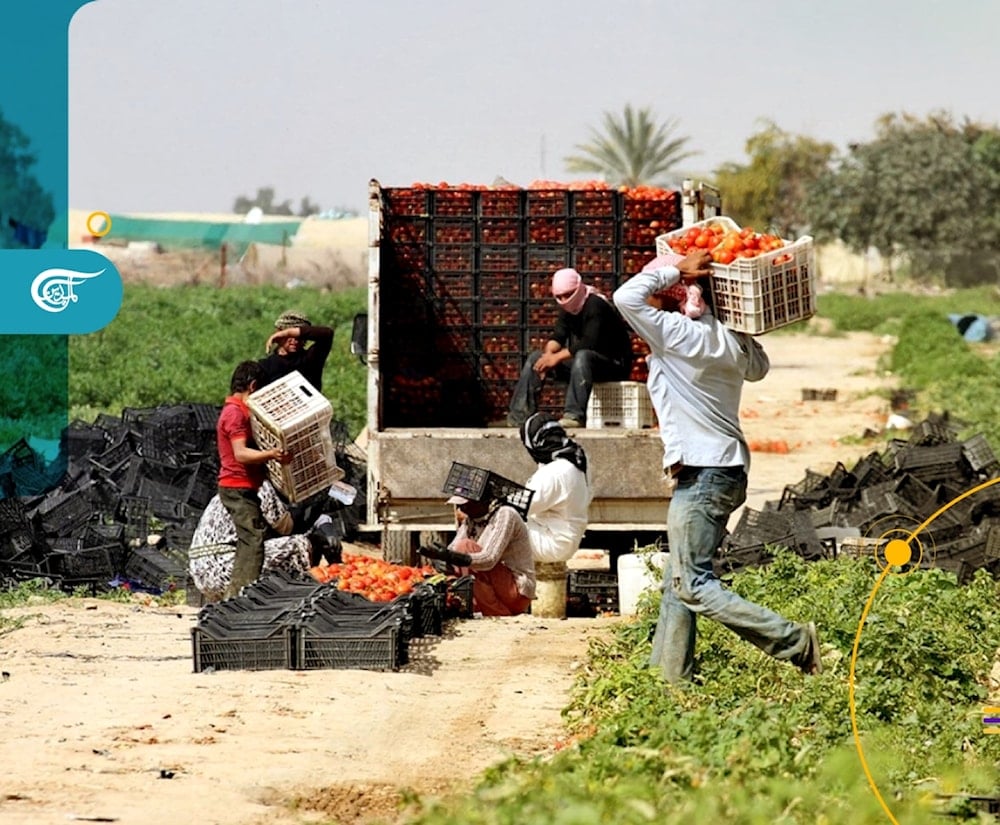South Lebanon's farmers remain steadfast amid Israeli aggression
Between the ravages of war and the state's abdication of its responsibilities, the southern farmer in the border villages lives in great suffering .
-

South Lebanon's farmers remain steadfast amid Israeli aggression
Bassam Alayan sets off with the sunrise to his field located near his home in the village of al-Bayyada, Tyre, southern Lebanon, followed by his son Mohammad to help him cultivate the land and secure the water supply networks. Under the watchful eyes of Israeli reconnaissance drones, the pair continue their work, as they have throughout the past five months despite the Israeli bombardment of southern Lebanon.
Every morning, Bassam plants the seedlings with great enthusiasm, and his forehead, glistening with the sweat of fatigue, shows relaxed features under the rays of the southern sun. With a subtle grin, Bassam told Al Mayadeen: "The sons of this land cannot leave it. We, the farmers, know very well what that means, and we will continue to cultivate every inch of it until our very last breath."
Bassam's experience reflects part of the current general scene of the agricultural scene in the border area in Tyre, which has undergone major setbacks, just like several other economic sectors.
Challenges and difficulties
Ahmed Awada, a farmer from the border town of Naqoura who specializes in various crops, especially bananas and citrus fruits, told Al Mayadeen about the reality of the agricultural sector in the region, underlining that "the farmer's work pattern has changed a lot during the war, especially in light of the current security challenges and risks."
The number of workers has decreased significantly, according to Awada, and the average hourly wage increased from 75,000 to 120,000 LBP. Moreover, many lands suitable for agriculture cannot be reached. "I rented, for example, about 130 dunams of these lands in Naqoura, Marwahin, Chihine, and other towns, and I prepared sections of them for the upcoming season before the start of the war, but now they cannot at all be reached."
When it comes to the harvest, Ahmed says that productivity has decreased significantly due to several reasons, as irrigation stopped in some areas, and in other areas, it was only done at certain times at an insufficient rate in addition to the fact that "pesticides were not sprayed effectively, especially on the citrus fields."
Ahmed underlined that the current challenges were not solely limited to the security situation, as the prices of pesticides and chemical fertilizers have seen an increase due to the change in global shipping costs, and the delay in the process of exporting bananas and citrus fruits to foreign countries has led to a decline in their price. For example: "The price of 2.5kg of bananas was equivalent to 200,000 LBP, but today it has become 75,000 LBP."
Ahmed also revealed that no state institution reached out to the farmers nor was there any action taken by any official bodies throughout the entire extent of the war despite these villages including about 50 farmers.
The same is true for Ismail Ismail, who still goes to his farmland located in the town of Naqoura, in the Iskandarona neighborhood near the border. The land is cultivated with watermelon and cantaloupe. "Traders are now demanding that farmers pay for seedlings, fertilizers and equipment in advance after they used to give the farmer a grace period until the crops were harvested and sold." He pointed out that "the cost of cultivating a watermelon and melon season is no less than $1,500 annually, and currently, it seems impossible due to the current situation and the inability to predict the future."
Syndicates fighting for farmers' rights
Ali Dbouq, who serves as Deputy President of the Citrus, Banana, and Tropical Trees Cooperative and Deputy President of the South Farmers' Syndicate, stated that "the economy of the border region is based primarily on agriculture, especially citrus fruits, bananas, olives, tobacco, beekeeping, and livestock."
"Losses have been incurred by all of these sectors, with more than 45,000 olive trees burned and nearly 1,100 beehives destroyed, equivalent to a loss of 15 tons of honey. This total loss is estimated at around half a million dollars. The initial estimate for crop losses is 20,000 tons of citrus fruits, 15,000 tons of bananas, and 2,000 tons of avocados," he added.
Regarding the role of the relevant official bodies, he stated that "there is no emergency plan or intervention on the part of the concerned ministries, and the matter was limited to conducting some surveys, carrying out tours, and promises of compensation after the attacks end." He said, "The syndicates have worked to raise their voices and appeal to the official authorities to intervene and compensate for the damages. They are also setting up projects to help farmers and beekeepers stand firm and continue."
Between the ravages of war and the state's abdication of its responsibilities, the southern farmer in the border villages lives in great suffering as he strives to maintain his livelihood and work. However, despite all this, he still possesses the determination and insistence to try as much as possible and stand in the face of the brutal war machine, because he realizes that the only way to live in his land with dignity is through struggle, steadfastness, and resilience.

 5 Min Read
5 Min Read








